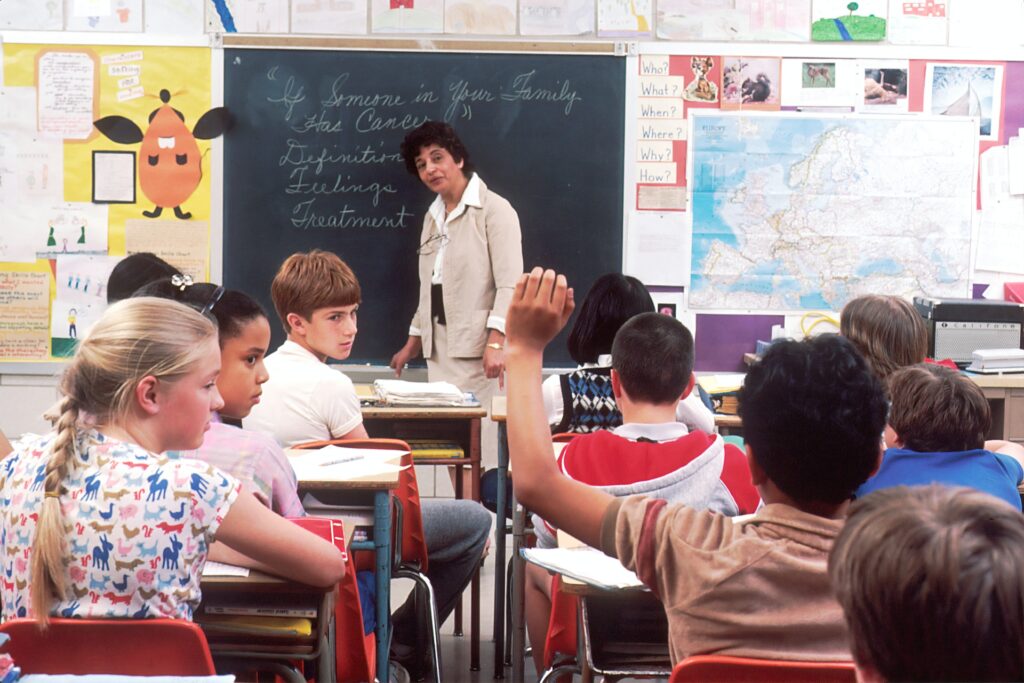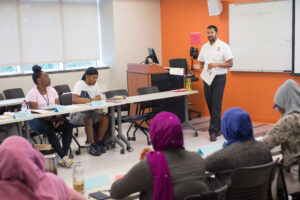Chapter 1: Introduction to Educational Psychology
Case Study
Preparing to be a Teacher

You are probably reading this textbook about Educational Psychology as you prepare for a career as a teacher. Most teacher preparation programs require an Educational Psychology course as part of the training to become a successful teacher.
Think About It
- Where are you in your teacher preparation program?
- How did you make the decision to be a teacher?
- What subject/grades are you hoping to teach when you finish your program?
In this Educational Psychology course, we will study strategies to optimize your students’ learning that will apply to students across all grades and in all subject areas. This will include information about planning effective lessons, setting up a classroom that supports learning, and building positive social-emotional connections with and among your students. We will discuss how students learn, including how the brain works and the best teaching strategies to use to maximize student learning. We will cover many ways to assess how well your students are learning and how to use the data from assessments to improve your teaching. You will also learn basic principles that will help you make the dozens of minute-to-minute decisions you face throughout the day as you keep your students engaged and motivated to learn.
The Personal and Professional Attribute of Successful Teachers
You may already have personal attributes that will help you become a successful teacher. Do you enjoy working with children? Do you have good communication skills and the ability to explain concepts clearly? Are you able to remain patient and calm in challenging situations? Are you compassionate when dealing with someone who is struggling to understand new information?
Think About It
List three personal attributes you have that may help you become an effective teacher. For each, describe a time that you used that personal attribute to help someone.
Professional attributes are also important for successful teaching. One current model of effective teachers, that is based on research, includes six professional qualities teachers should have to maximize student learning (Stronge, 2018)[1]:
- Knowledge of the content of the subject you are teaching, how to best teach that subject, and general strategies for effective teaching of any subject.
- Skills in designing and organizing instructional plans.
- Strategies to deliver instruction that engage students with a range of ability levels.
- Ability to design and carry out assessments to measure student progress and to guide your instruction.
- Skills in Implementing classroom procedures and rules, and in designing a physical layout that supports learning and safety.
- Appropriate use of compassion, respect, enthusiasm, and self-reflection to create a positive social-emotional classroom environment.
Think About It
- Which of the six professional qualities do you want to focus on developing as you complete your teacher preparation program, so you are prepared to be an effective teacher when you graduate?
- Which of the six qualities do you believe you will continue to develop in the future, through years of experience as a classroom teacher?
Think About It
Recall a class that you enjoyed as a student. List some of the personal characteristics of the teacher that helped make learning in that classroom enjoyable. List a few of the professional qualities the teacher had that supported student learning.
Importance of Evidence-Based Teaching Practices

Did you notice that the discussion of the six professional qualities of effective teachers, above, states that the qualities are based on research? This means that someone conducted a research study to determine which qualities of teachers make them effective. In this case, the study used a wide range of outcomes to measure a teacher’s effectiveness, from students’ grades to the likelihood that the students will eventually attend college.
The discussion of the research included a citation for the source of the information about the six qualities. The citation was “Stronge, 2018.” This means that the last name of the author of the publication about the research was Stronge and it was published in 2018. In the reference list you can find more details about the source. The reference list entry says “Stronge, J. H. (2018). Qualities of effective teachers (3rd ed.). ASCD.” This means that the results of the research about professional qualities of effective teachers was published in a book called Qualities of Effective Teachers, the third edition of the book was published in 2018, and the book was published by an organization called ASCD.
You will find citations for publications of research studies throughout this textbook. Whenever we mention a research study, we will include a citation for the publication so that you can find and read the publication for more information if you would like. You can contact a campus librarian if you need help finding it.
You will find that some of the publications cited in this textbook were published a number of years ago. In most cases, these are classical studies still relevant today because they provided significant findings that influenced education, psychology, or neuroscience in fundamental ways. In other cases, older research may be cited because there are no more recent noteworthy publications about a topic.
We focus on using evidence-based practices in educational psychology because it is essential for effective teaching. There will be limited time to meet all of your teaching goals each school year, so relying on the most effective teaching practices, rather than simply personal beliefs or fads, will help maximize student learning in the time available. Descriptions of how to implement evidence-based practices in your classroom are included in every chapter of this book.
The Art of Teaching

Even though you should emphasize the use of evidence-based practices when you teach, we know there is an art to teaching well, an opportunity to teach creatively. Once you know the science of education – that is, what research has found are the best practices — you can then apply that science to the individual students in your classroom and the specific content you are teaching. As the teacher responsible for that classroom, you will know the optimal way to apply the best teaching practices in your unique classroom. For example, in this textbook we will discuss principles for using student groups to improve learning. As the teacher in your classroom, you will choose the most suitable approach to apply those principles to the content you teach and the specific students you have in your classroom at the time. In this way, it is clear effective teaching is both a science based on research and an art of applying that research.
In the next section, we will discuss types of educational research and how the qualities of each influence the value of using the findings to guide your teaching. We will also talk about how you, as a teacher, can conduct research in your own classroom. You can collect and analyze data about your students to improve your teaching and improve their achievement.
- Stronge, J. H. (2018). Qualities of effective teachers (3rd ed.). ASCD ↵
Identifies the source of information; includes the authors' names and the publication date.
A list of all the sources of information used to write a document.
